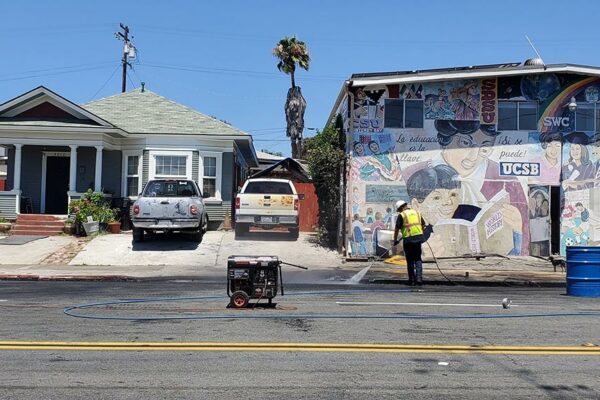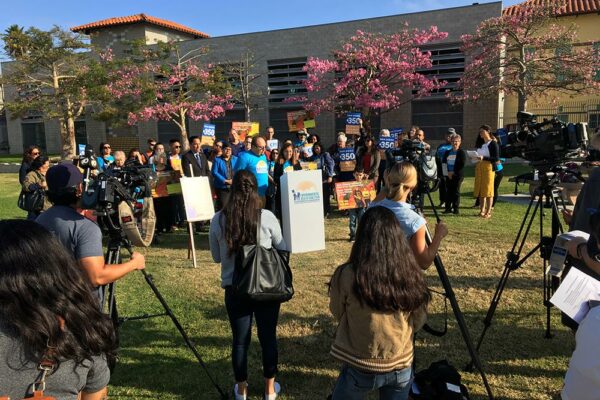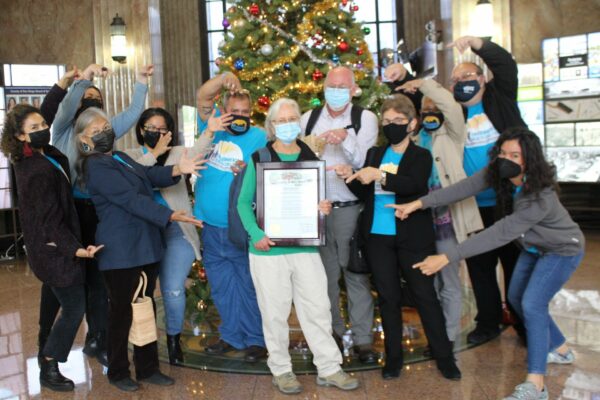Barrio Logan Truck Crash Endangers Residents
SAN DIEGO, August 9, 2019 – Early this morning a heavy duty diesel truck crashed in Barrio Logan on a block with homes and businesses. It crashed into a power pole causing a power outage for over 4000 users. The truck then skidded across lanes and crashed into parked vehicles. After coming to rest, the truck burst into flames directly in front of a home.
The truck burst into flames a few feet from a home where a truck parked in the driveway was scorched. A family living less than 100 feet away awoke to find an inferno on their block. Firefighters responded rapidly saving the home and nearby business. The Navy’s family support center is directly across the street.
While we applaud the first responders and are grateful for their courage – this incident is not uncommon in Barrio Logan where discriminatory land use allows homes and industries to exist side by side. Diesel trucks from the Port of San Diego and waterfront businesses have historically used residential streets in Barrio Logan exposing residents to diesel pollution.
In December 2018, the City of San Diego adopted a truck ordinance prohibiting heavy duty trucks from traveling on Barrio Logan streets other than the established truck route on Harbor Drive. While a victory for the community, residents report heavy duty trucks continuing to use streets prohibited by the ordinance.
Philomena Marino, a resident on Boston Ave, said: “This is not an isolated incident. My neighbors and I have been monitoring truck traffic on our street and the surrounding area and we have footage of heavy duty trucks driving past our homes regularly, in violation of the ordinance. While we are all relieved that residents weren’t injured, we are demanding that officials take immediate and increased action to enforce the ordinance and protect the community.”
Environmental Health Coalition joins community residents to demand that immediate action be taken including:
- Increase enforcement by San Diego PD. This should include posting officers in the neighborhood on a regular basis to issue citations to truckers driving on prohibited streets.
- Resident reports should be acted on. Neighbors continuously report violations of the ordinance but do not receive responses. Neighbor reports and photos of trucks in violation of the ordinance should be used to issue warnings to the truckers.
- Improved and additional signage on the truck route and prohibited streets should include lights and posting of the penalty fine
- Residents should report any illegal truck traffic to the SD PD non-emergency line 619-531-2000.
For more information, please contact Diane Takvorian at 619-992-0805 or dianet@environmentalhealth.org.
###
ABOUT ENVIRONMENTAL HEALTH COALITION
Founded in 1980, Environmental Health Coalition (EHC) builds grassroots campaigns to confront the unjust consequences of toxic pollution, discriminatory land use and unsustainable energy policies. Visit online at http://www.environmentalhealth.org.
Community Budget Alliance pushes for a People’s Budget
San Diego’s FY2020 budget includes historic funding for language justice and parks in overburdened communities but fails to prioritize transportation justice or provide protections for renters and workers
SAN DIEGO: The Community Budget Alliance (CBA) has accomplished two major historic wins, but the City still needs to do more to protect low income working families. As a result of two years of advocacy by the CBA, in FY2020, the City of San Diego will provide translation services at Community Planning Group meetings. Emerald Hills Park, one of the few outdoor public spaces in Southeast San Diego, will finally see renovations after 20 years of calls from the community.
In a richly diverse border city like San Diego, language justice is critical to democracy. Over 30 languages are spoken in the City of San Diego and 1 of every 7 people in the city do not speak English well. Providing translation services at community planning group meetings leads to community-oriented infrastructure planning.
Esperanza Miranda, a Promotora for the Environmental Health Coalition, a CBA member organization and leading voice in the call for language justice, has organized in City Heights for over 10 years without translation support.
“It is unjust that I am unable to understand the conversations during planning group meetings in my own community,” noted Esperanza. “Translation services at the City Heights Area Planning Committee (CHAPC) meetings will allow me to have meaningful participation in discussing critical issues affecting our community.”
The FY2020 budget also includes funding to amend the General Development Plan for Emerald Hills Park. Emerald Hills Park was built over 50 years ago, and has had no significant upgrades since then. Community members will finally have the opportunity to tell the City what upgrades and changes they want to see in the park.
“Emerald Hills is a diverse community and we have an opportunity to create a park that reflects our community. This is about more than a park, it’s about us leading the vision for our community,” said Evelyn Smith, president of the Emerald Hills Town Council.
Community Budget Alliance advocacy also led to funding for:
- A disparity study on all city contracts
- A Mobility Action Plan, which will serve as a guide for the planning and prioritization of future projects related to walking, biking and public transit
- More code enforcement officers to fight substandard housing
These are historic wins, but they are not enough.
Transportation continues to be the single largest emitter of greenhouse gas (GHG) emissions in San Diego. The city currently lacks the capacity to achieve its Climate Action Plan goals, yet the FY2020 budget will not include funding for a Transportation Justice Coordinator in the city’s Sustainability Department. Environmental justice communities bear disproportionate burdens of toxic pollution, face lack of transportation connectivity, and do not have access to safe pedestrian infrastructure. We urge the City Council to prioritize increasing staff capacity to address these conditions and align their efforts with regional transit developments.
The CBA continues to advocate for a Tenants Right to Counsel Program to prevent homelessness, and fight the mass displacement of residents of color.
“Without Tenants Right to Counsel unscrupulous landlords will bring units up to code but then unfairly evict the tenants. Having legal representation can mean the difference between people staying in their homes and being forced out to the streets,” said Miriam Melendez, an organizer for ACCE (Alliance of Californians for Community Empowerment), an organization leading statewide efforts to protect tenants and fight rising housing costs.
At the same time that high housing costs are pushing low-income families out of San Diego, greedy employers are stealing wages from our most vulnerable workers. Employers steal $2 billion dollars from California workers every year just by failing to pay the minimum wage. It is up to the Mayor and City Council to protect workers and renters and ensure that all families have the means to stay in this city. The CBA will continue its ongoing fight for an Office of Labor Standards Enforcement to proactively protect workers facing wage theft and retaliation. During this budget cycle the mayor has again failed to prioritize protections for the most impacted communities.
For more information, please contact
Jessica Córdova, 619-252-0746, jcordova@onlinecpi.org
or
Carolina Martinez, 714-580-2921, carolinam@environmentalhealth.org
Environmental Justice Victory for National City as Port of San Diego Hears Community Demands and Rejects New Shipyard Proposal
May 19, 2020 – SAN DIEGO, CA – National City residents today joined Environmental Health Coalition (EHC), industrial and labor organizations to give virtual testimonies at San Diego Port Commissioners Board Meeting. Through live and written feedback, they called upon the Board to reject a proposal by Austal USA to build a major ship repair facility in West National City.
While the decisive vote on the Austal proposal was welcome news for the community, the Board of Port Commissioners took a second action, adopted unanimously, to continue to explore opportunities for ship repair operations on Port Tidelands. This leaves the door open for additional industrial activities that will threaten the health and well-being of National City residents.
The proposed Austal ship repair facility would have created a significant new source of air pollution in one of the region’s most impacted communities. National City, a designated AB 617 environmental justice community, already ranks in the top 95-97 percentile for diesel particulate matter (PM) in California. It has one of the San Diego region’s highest rates of asthma-related emergency room visits for children and seniors.
“I disagree with allowing a new shipyard in National City, as it contradicts the dedicated efforts to protect communities disproportionally impacted by air pollution,” testified Silvia Calzada, a National City resident, asthma patient, and longtime member of EHC’s Community Action Team. “It is clear that shipbuilding and ship repair will significantly increase air pollution in my community.”
In addition to worsening air quality, ship repair operations such as Austal’s use toxic materials and generate hazardous wastes threatening nearby communities, and the land and marine ecosystems of San Diego Bay. These include poisonous, hazardous, and flammable materials such as lead, zinc, and volatile organic compounds (VOCs).
David Flores, EHC Air Quality Director, strongly urged the Port Commissioners to protect public health and stay the course on emission reductions. “Any new shipyard operations will be a deviation from the Port of San Diego’s commitment to improve local air quality and significantly reduce maritime-related emissions, and a great disservice to portside communities such as National City and Barrio Logan already disproportionately impacted by high levels of air pollution.”
“National City is park-poor but has won commitments from the Port to expand Pepper Park, stated Danny Serrano, EHC Campaign Director. “The Port must act to ensure that new uses near within the Pepper Park area will not be incompatible with the park expansion or bring further sources of pollution that would negatively affect the park users.”
National City and Barrio Logan can simply not endure the disproportionate pollution and land use incompatibilities associated with any new shipyards in their communities.
For more information, please contact Bari Samad at 619-343-6509 or baris@environmentalhealth.org.
###
ABOUT ENVIRONMENTAL HEALTH COALITION
Founded in 1980, Environmental Health Coalition (EHC) builds grassroots campaigns to confront the unjust consequences of toxic pollution, discriminatory land use, and climate change. Visit online at http://www.environmentalhealth.org.
Winner of ‘Nobel Prize’ in Air Quality Achievements is First-Ever Environmental Justice Recipient of Prestigious Award
NATIONAL CITY, Tuesday, April 28, 2020 – Joy Williams, research director with Environmental Health Coalition (EHC), has received the 2019 Haagen-Smit Clean Air Award from the California Air Resources Board (CARB). For over 30 years, Williams has dedicated her career to reducing pollution and improving health in the most impacted communities in the San Diego/Tijuana region and throughout California. She is the first-ever awardee in the Community Service and Environmental Justice category of the prestigious recognition.
The premier California award honors Dr. Arie J. Haagen-Smit, who was a leader in developing air quality standards based on his research efforts. CARB bestows the distinguished award annually to recognize individuals with exceptional career accomplishments in one or more air quality and climate change categories.
“As an asthma patient and resident of National City, I am truly grateful for William’s expertise and dedication to our community,” said Silvia Calzada, a longtime member of EHC’s Community Action Team. “Her diverse skill set enables her to compile and synthesize data, conduct air quality monitoring, develop community surveys, conduct popular education with residents, and deliver compelling project analyses and testimonies at public hearings.”
Williams received an MPH in1986 from San Diego State University and has since been empowering residents of disadvantaged communities in the San Diego-Tijuana region to protect themselves and their environment from toxic pollutants. Among her notable accomplishments, she served on the original Office of Environmental Health Hazard Assessment team tasked with developing a cumulative environmental impact analysis that would ultimately become CalEnviroScreen.
“I have had the privilege of working with Joy almost since the inception of EHC. Her tireless efforts have led to countless accomplishments that have improved San Diego/Tijuana’s air quality and improved public health,” noted Diane Takvorian, EHC’s executive director. “Joy is a unique professional who translates complex scientific data for non-scientists and her expertise is well-regarded by government agency regulators, impacted families, and environmental advocates alike.”
As research director at EHC, Williams has led multi-disciplinary teams of academics, healthcare providers, and community advocates; written numerous publications on pollution prevention, air quality, land-use, cumulative impacts, health impacts; and developed technical analyses for environmental review documents.
For more information, please contact Bari Samad at 619-343-6509 or baris@environmentalhealth.org.
###
ABOUT ENVIRONMENTAL HEALTH COALITION
Founded in 1980, Environmental Health Coalition (EHC) builds grassroots campaigns to confront the unjust consequences of toxic pollution, discriminatory land use, and climate change. Visit online at http://www.environmentalhealth.org.
Carolina Martinez and Paradise Creek Apartments Receive National Planning Award
Carolina Martinez and Paradise Creek Apartments Receive National Planning Award
Recipient of the American Planning Association’s 2019 Advancing Diversity and Social Change Award in Honor of Paul Davidoff brought affordable housing to a low-income community of color.
CHICAGO –Carolina Martinez, policy director with the Environmental Health Coalition (EHC), has received the 2019 Advancing Diversity & Social Change Award in Honor of Paul Davidoff by the American Planning Association. Martinez is receiving the award for her work with residents of National City, California, to develop the Paradise Creek Apartments. The apartment development remediated a hazardous site in a low-income community of color and provided needed affordable housing near transit.
The Paul Davidoff award honors an individual, project, group or organization that promotes diversity and demonstrates a sustained commitment to advocacy by addressing the concerns of women and people of color through specific actions or contributions within the planning profession or through planning practice. The award honors the late APA member, Paul Davidoff, for his contributions to the planning profession.
“When others would say the Paradise Creek Apartments were impossible, Carolina made us believe that it was,” said Lorena Chavez, one of the lead resident organizers for the project. “She would organize visits to other affordable housing communities for us to visualize our dream and learn more about the resources offered. Carolina helped us come up with a plan to make our dream come true.”
Paradise Creek Apartments show how fiscal policy can achieve environmental justice by extending investments to the most disadvantaged communities. Most important, Paradise Creek demonstrates community-based planning at its best, with residents working together to create the community they want to live in.
According to the San Diego County Department of Environmental Health, National City is currently home to 32 million pounds of hazardous substances and 870,000 cubic feet of toxic or hazardous gases. In the Old Town neighborhood of National City, these polluting industries are mixed with residential properties and schools. As a result, 14 percent of children suffer from asthma, and the economic benefits of the industrial uses do not compensate for the negative health and quality of life impacts.
Encouraged by the community, the city prepared the Westside Specific Plan in 2005 to comprehensively address environmental and land use issues, leading to a plan that reflects residents’ aspirations for their community. These priorities were outlined in a 2005 community survey, which include:
- Construction of new affordable housing;
- Phasing out auto-body shops to a heavy industrial area; and
- Changing the zoning of Old Town to residential and residential-compatible land uses.
Martinez, who emigrated to the U.S. from Colombia at the age of 14, advocated together with residents during the process and ensured residents with limited English proficiency had input on the plan.
National City’s designation as a “disadvantaged community” through CalEnviroScreen made it eligible for investment through the Greenhouse Gas Reduction Fund (GGRF). Martinez and other environmental advocates lobbied the California State Assembly for significant portions of this fund to be dedicated to disadvantaged communities, like Old Town. After receiving a $9.2 million GGRF grant, the Paradise Creek affordable housing project, an infill transit-oriented development was able to be completed.
“Carolina’s cultural competency and commitment to community-driven land use planning helped improve the quality of life of the community, while ensuring that the community spoke for themselves,” said Jury Chair Wendy Shabay, AICP. “Through her tireless efforts, she has made a long-lasting, positive impact that will benefit generations to come.”
APA’s national excellence awards – the APA’s highest honor – is a proud tradition established more than 50 years ago to recognize outstanding community plans, planning programs and initiatives, public education efforts, and individuals for their leadership on planning issues.
The 2019 APA National Planning Award recipients will be honored at a special luncheon on April 15, 2019 during APA’s National Planning Conference in San Francisco. The award winners will also be featured in the May issue of Planning magazine.
For a complete list of the APA’s 2019 National Planning and Excellence and Achievement Award recipients, visit www.planning.org/awards/2019.
# # #
The American Planning Association is an independent, not-for-profit educational organization that provides vital leadership in creating communities of lasting value. APA and its professional institute, the American Institute of Certified Planners, are dedicated to advancing the professional of planning, offering better choices for where and how people work and live. The 42,000 APA members work in concert with community residents, civic leaders and business interests to create communities that enrich people’s lives. Through its philanthropic work, APA’s Foundation helps to reduce economic and social barriers to good planning. APA has offices in Washington, D.C. and Chicago. Learn more at www.planning.org.
Press Release from American Planning Association.
NOTE: Environmental Health Coalition worked closely with the non-profit affordable housing organization, Community Housing Works, to bring fiscal resources, housing expertise and community priorities together to make the project possible.
For more information, please contact:
Roberta Rewers, APA, 312.786.6395, rrewers@planning.org
or
Bari Samad, EHC, 619-343-6509, baris@environmentalhealth.org.
New Legislation Calls for Reform of San Diego Air Pollution Control District
SAN DIEGO, February 8, 2019 – Today, California State Assemblymember Todd Gloria (D-San Diego) introduced legislation to reform the governing board of the San Diego Air Pollution Control District (APCD). The bill, AB 423, sponsored by the Environmental Health Coalition (EHC), will change the board’s membership to better represent the diversity of San Diego’s residents.
“All communities deserve to breathe clean air, but we know not all communities do. With air pollution as a component of climate change and the effects of climate change occurring all around, it’s clear business as usual isn’t getting the job done,” said Assemblymember Gloria. “By transforming San Diego’s Air Pollution Control District into a more diverse and representative body, I believe we have the real potential to get the County to take aggressive action and ensure that whatever strategies are implemented, they are equitably distributed throughout the region.”
The legislation will bring the San Diego APCD in line with other large metropolitan districts in California by requiring representation from all cities, and of public members including health professionals. The current air district board is comprised only of the five members of the County Board of Supervisors.
“San Diego has a serious air pollution problem. We need new leadership through a proactive board that will adopt strict rules to reduce emissions and improve public health, especially in the communities most impacted,” noted EHC Executive Director, Diane Takvorian. “Air monitors in Chula Vista and El Cajon both indicated a human cancer risk of over 300 per million, which is unacceptably high. This does not even include diesel particulate matter, the number one cancer causing pollutant in outdoor air.”
For decades, air pollution from multiple sources such as port operations, heavy diesel traffic, and local zoning that allows industrial businesses to be located near homes and schools, has plagued communities such as Barrio Logan and National City. The rate of asthma emergency room visits for children living here is up to three times higher than other areas in the county.
“Our communities have a right to know how air pollution is impacting them,” said Sandy Naranjo, a resident of National City. “Regular notifications of health risks should be sent to residents. Elected officials need to involve us, not just industries and polluters, in the process of making rules and standards that have serious impacts on our health and wellbeing.”
An Assembly committee will hear AB 423 in April. If passed into law, it would increase the APCD Board membership to 11 individuals representing each city in the region and members of the public.
For more information, please contact Bari Samad at 619-343-6509 or baris@environmentalhealth.org.
###
ABOUT ENVIRONMENTAL HEALTH COALITION
Founded in 1980, Environmental Health Coalition (EHC) builds grassroots campaigns to confront the unjust consequences of toxic pollution, discriminatory land use and unsustainable energy policies. Visit online at http://www.environmentalhealth.org.





















